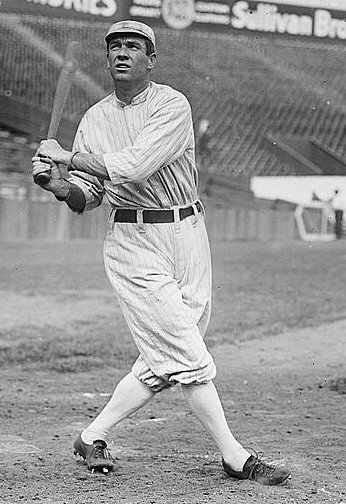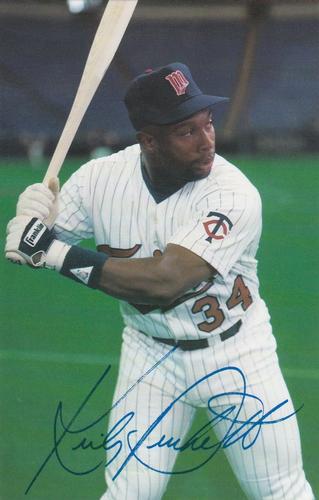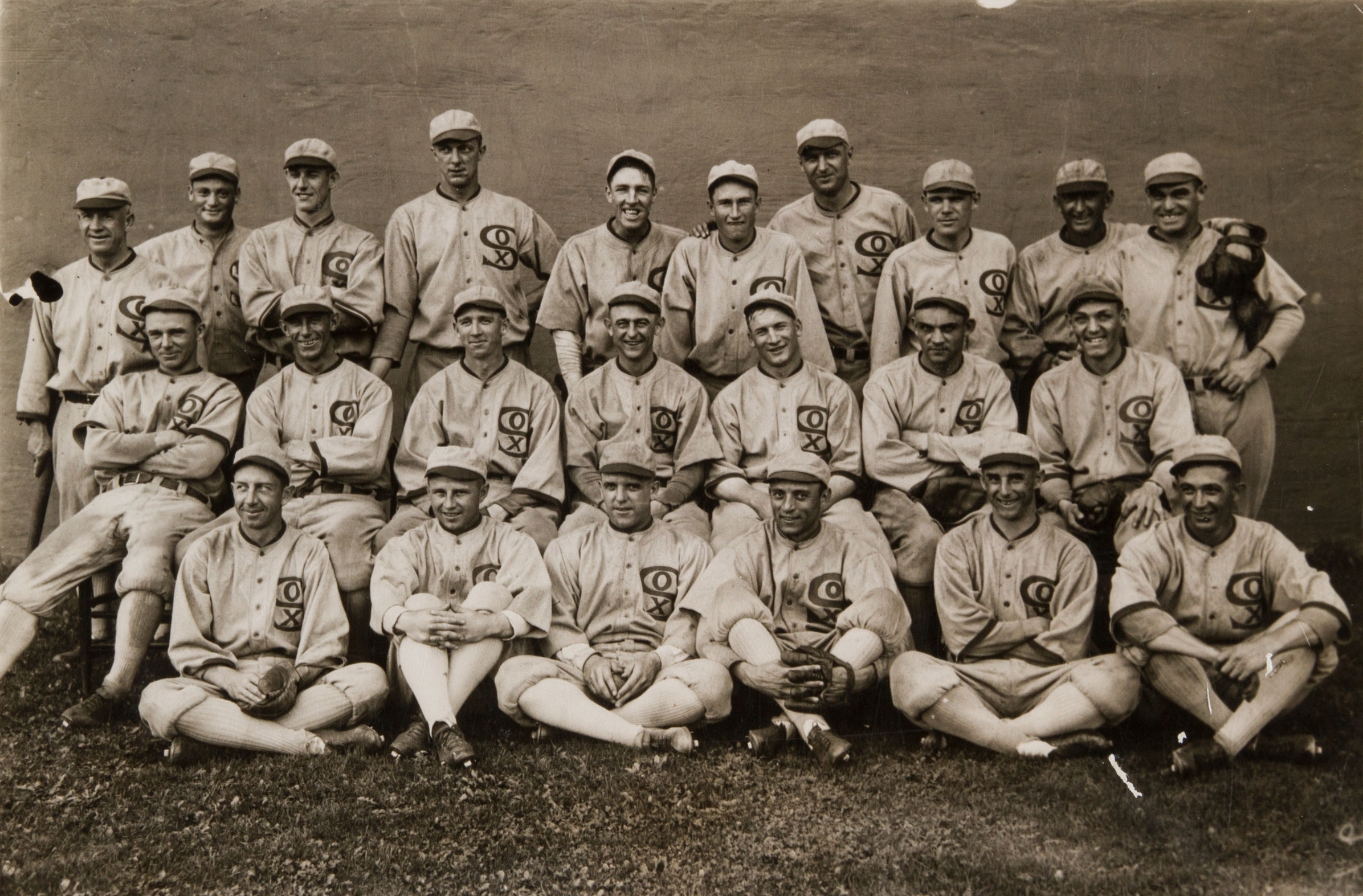|
Greg Gagne (baseball Player)
Gregory Carpenter Gagne (; born November 12, 1961) is a former shortstop in Major League Baseball. He played 10 seasons for the Minnesota Twins from 1983 to 1992, including both of the Twins' World Series championship teams in 1987 and 1991. He was considered one of the American League's best defensive shortstops during his time with Minnesota. Playing career Greg Gagne was drafted by the New York Yankees in the fifth round of the 1979 Major League Baseball Draft and spent the next three seasons in the Yankees' minor league system before being traded to the Twins on April 10, 1982, along with starting pitcher Paul Boris and reliever Ron Davis for the Twins starting shortstop, Roy Smalley. Gagne spent all of 1982 and all but 12 games of the 1983 and 1984 seasons in the minors before earning the starting shortstop job in 1985, after which Gagne became a fixture of the Twins' infield for the next eight seasons. On October 4, 1986, during a Twins' home game at the Hubert H. H ... [...More Info...] [...Related Items...] OR: [Wikipedia] [Google] [Baidu] |
Shortstop
Shortstop, abbreviated SS, is the baseball or softball fielding position between second and third base, which is considered to be among the most demanding defensive positions. Historically the position was assigned to defensive specialists who were typically poor at batting and were often placed at the bottom of the batting order. Today, shortstops are often able to hit well and many are placed at the top of the lineup. In the numbering system used by scorers to record defensive plays, the shortstop is assigned the number 6. More hit balls go to the shortstop than to any other position, as there are more right-handed hitters in baseball than left-handed hitters, and most hitters have a tendency to pull the ball slightly. Like a second baseman, a shortstop must be agile, for example when performing a 4-6-3 double play. Also, like a third baseman, the shortstop fields balls hit to the left side of the infield, where a strong arm is needed to throw out a batter-runner befo ... [...More Info...] [...Related Items...] OR: [Wikipedia] [Google] [Baidu] |
Ron Davis (pitcher)
Ronald Gene Davis (born August 6, 1955) is a former Major League Baseball pitcher who played 11 years from 1978 to 1988. Davis played for the New York Yankees and Minnesota Twins of the American League and the Chicago Cubs, Los Angeles Dodgers, and San Francisco Giants of the National League. He was selected to the American League All-Star team in 1981. Life and career Davis was born in Houston, Texas. Standing 6' 4", he was a hard-throwing right-handed relief pitcher. During his career he appeared in 481 games all in relief, and recorded 130 saves. Originally drafted by the Chicago Cubs, he was traded while still in the minor leagues to the New York Yankees in 1978. While in New York he was used as the team's closer after an injury to All-Star relief pitcher Rich Gossage. Also, while with the Yankees, he was one of the first pitchers ever to be used exclusively as a middle-inning "set-up" pitcher for his team's closer. For two seasons, 1980 and 1981, Davis and Gossage were an ... [...More Info...] [...Related Items...] OR: [Wikipedia] [Google] [Baidu] |
Double (baseball)
In baseball, a double is the act of a batter striking the pitched ball and safely reaching second base without being called out by the umpire, without the benefit of a fielder's misplay (see error) or another runner being put out on a fielder's choice. A double is a type of hit (the others being the single, triple and home run) and is sometimes called a "two-bagger" or "two-base hit". For statistical and scorekeeping purposes it is denoted by 2B. Description Typically, a double is a well-hit ball into the outfield that finds the "gap" between the center fielder and one of the corner outfielders, bounces off the outfield wall and down into the field of play, or is hit up one of the two foul lines. To hit many doubles, a batter must have decent hitting skill and power; it also helps to run well enough to beat an outfield throw. Doubles typically drive in runs from third base, second base, and even from first base at times. When total bases and slugging percentages are ca ... [...More Info...] [...Related Items...] OR: [Wikipedia] [Google] [Baidu] |
Hit (baseball)
In baseball statistics, a hit (denoted by H), also called a base hit, is credited to a batter when the batter safely reaches or passes first base after hitting the ball into fair territory with neither the benefit of an error nor a fielder's choice. Scoring a hit To achieve a hit, the batter must reach first base before any fielder can either tag him with the ball, throw to another player protecting the base before the batter reaches it, or tag first base while carrying the ball. The hit is scored the moment the batter reaches first base safely; if he is put out while attempting to stretch his hit to a double or triple or home run on the same play, he still gets credit for a hit (according to the last base he reached safely on the play). If a batter reaches first base because of offensive interference by a preceding runner (including if a preceding runner is hit by a batted ball), he is also credited with a hit. Types of hits A hit for one base is called a single, for two ... [...More Info...] [...Related Items...] OR: [Wikipedia] [Google] [Baidu] |
Run (baseball)
In baseball, a run is scored when a player advances around first, second and third base and returns safely to home plate, touching the bases in that order, before three outs are recorded and all obligations to reach base safely on batted balls are met or assured. A player may score by hitting a home run or by any combination of plays that puts him safely "on base" (that is, on first, second, or third) as a runner and subsequently brings him home. Once a player has scored a run, they may not attempt to score another run until their next turn to bat. The object of the game is for a team to score more runs than its opponent. The Official Baseball Rules hold that if the third out of an inning is a force out of a runner advancing to any base then, even if another baserunner crosses home plate before that force out is made, his run does not count. However, if the third out is not a force out, but a tag out, then if that other baserunner crosses home plate before that tag out is made, ... [...More Info...] [...Related Items...] OR: [Wikipedia] [Google] [Baidu] |
At Bat
In baseball, an at bat (AB) or time at bat is a batter's turn batting against a pitcher. An at bat is different from a plate appearance. A batter is credited with a plate appearance regardless of what happens during their turn at bat, but a batter is credited with an at bat only if that plate appearance does not have one of the results enumerated below. While at bats are used to calculate certain statistics, including batting average and slugging percentage, a player can qualify for the season-ending rankings in these categories only if they accumulate 502 plate appearances during the season. Batters will not receive credit for an at bat if their plate appearances end under the following circumstances: * They receive a base on balls (BB).In 1887, Major League Baseball counted bases on balls as hits (and thus as at-bats). The result was high batting averages, including some near .500, and the experiment was abandoned the following season. * They are hit by a pitch (HBP). * They ... [...More Info...] [...Related Items...] OR: [Wikipedia] [Google] [Baidu] |
Plate Appearances
In baseball statistics, a player is credited with a plate appearance (denoted by PA) each time he completes a turn batting. Under Rule 5.04(c) of the Official Baseball Rules, a player completes a turn batting when he is put out or becomes a runner. This happens when he strikes out or is declared out before reaching first base; or when he reaches first base safely or is awarded first base (by a base on balls, hit by pitch, catcher's interference, or obstruction); or when he hits a fair ball which causes a preceding runner to be put out for the third out before he himself is put out or reaches first base safely (''see also'' left on base, fielder's choice, force play). A very similar statistic, at bats, counts a subset of plate appearances that end under certain circumstances. Use as batting record qualifier While at bats are used to calculate batting averages, slugging percentages, plate appearances have no such statistical value. However, at season's end, a player must have a ... [...More Info...] [...Related Items...] OR: [Wikipedia] [Google] [Baidu] |
Pat Meares
Patrick James Meares (born September 6, 1968) is a former Major League Baseball shortstop. Meares was the 12th round draft pick of the 1990 amateur draft by the Minnesota Twins, from Wichita State University. Meares made his major league debut on May 5, 1993 with the Minnesota Twins. He played six full seasons with the Minnesota Twins, with a high of 152 games in 1996. He was granted free agency after the 1998 season, and he then signed with the Pittsburgh Pirates before the 1999 season. He played two full seasons and one incomplete season (1999 with 21 games) with the Pittsburgh Pirates with a career high of a .308 batting average in 1999. Meares played 742 games with the Minnesota Twins and 239 games with the Pittsburgh Pirates, with a total of 981 professional baseball games in his career. His last major league game took place on October 7, 2001 vs. Chicago Cubs. He led the American League The American League of Professional Baseball Clubs, known simply as the American L ... [...More Info...] [...Related Items...] OR: [Wikipedia] [Google] [Baidu] |
Kirby Puckett
Kirby Puckett (March 14, 1960 – March 6, 2006) was an American professional baseball player. He played his entire 12-year Major League Baseball (MLB) career as a center fielder for the Minnesota Twins (1984–1995). Puckett is the Twins' all-time leader in career hits, runs, and total bases. At the time of his retirement, his .318 career batting average was the highest by any right-handed American League batter since Joe DiMaggio. Puckett was the fourth baseball player during the 20th century to record 1,000 hits in his first five full calendar years in Major League Baseball, and was the second to record 2,000 hits during his first ten full calendar years. After being forced to retire in 1996 at age 36 due to loss of vision in one eye from a central retinal vein occlusion, Puckett was elected to the Baseball Hall of Fame in 2001, his first year of eligibility. Early life Puckett was born in Chicago, Illinois, and he was raised in Robert Taylor Homes, a housing project on ... [...More Info...] [...Related Items...] OR: [Wikipedia] [Google] [Baidu] |
Charlie Leibrandt
Charles Louis Leibrandt, Jr. (; born October 4, 1956) is a former Major League Baseball pitcher who played from 1979 to 1993 for the Cincinnati Reds, Kansas City Royals, Atlanta Braves, and Texas Rangers. Leibrandt was a productive pitcher throughout his 14-year career and a member of the 1985 World Series champion Royals team. Early years and education Leibrandt was born in Chicago, Illinois. He attended Miami University, in Oxford, Ohio, from 1975–1978, where he earned four letters as a pitcher on the baseball team. During his senior year, Leibrandt was selected first-team All-MAC; he compiled a record of 7–2 with an ERA of 1.65. Career Leibrandt was drafted by the Cincinnati Reds in the ninth round of the 1978 free agent draft. He made his debut in Major League Baseball on September 17, 1979 in a Cincinnati Reds uniform. A few weeks later, he made his first post-season appearance in the 1979 National League Championship Series, recording an out of the only batter ... [...More Info...] [...Related Items...] OR: [Wikipedia] [Google] [Baidu] |
Floyd Bannister
Floyd Franklin Bannister (born June 10, 1955) is an American former professional baseball left-handed pitcher, who played in Major League Baseball (MLB) for the Houston Astros (–), Seattle Mariners (–), Chicago White Sox (–), Kansas City Royals (–), California Angels (), and Texas Rangers (). Bannister also played for the Yakult Swallows of Nippon Professional Baseball (NPB), in . History In 1973, as a high school senior, Bannister led his Kennedy High School team to a state championship, pitching 15 wins and 0 losses with a season ERA of 0.00. Seattle Times, 2003 May 29"Seasons in the sun: Prep athletes who have left indelible marks"/ref> Bannister went on to attend Arizona State University, where he was named college player of the year by The Sporting News as a junior. This led to his selection by the Houston Astros as the first overall pick of the 1976 amateur draft. After pitching just seven games in the minors in , Bannister opened the season with the Astr ... [...More Info...] [...Related Items...] OR: [Wikipedia] [Google] [Baidu] |
Chicago White Sox
The Chicago White Sox are an American professional baseball team based in Chicago. The White Sox compete in Major League Baseball (MLB) as a member club of the American League (AL) Central division. The team is owned by Jerry Reinsdorf, and plays its home games at Guaranteed Rate Field, located on Chicago's South Side. The White Sox are one of two MLB teams based in Chicago, the other being the Chicago Cubs of the National League (NL) Central division. One of the American League's eight charter franchises, the White Sox were established as a major league baseball club in as the Chicago White Stockings, before shortening their name to the White Sox in . The team originally played their home games at South Side Park before moving to Comiskey Park in , where they played until . They moved into their current home, which was originally also known as Comiskey Park like its predecessor and later carried sponsorship from U.S. Cellular, for the 1991 season. The White Sox won t ... [...More Info...] [...Related Items...] OR: [Wikipedia] [Google] [Baidu] |




.jpg)

